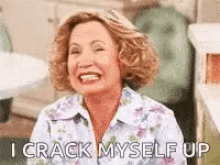Honestly, before taking this course, I never gave much thought to my digital identity. I was married at 24 and raised three kids before getting back into the workforce in 2014. Being a stay-at-home-mom, I wasn’t closely following the new technology trends. I didn’t have a cell phone until I was about 29 years old, and still it was just a flip phone. I had a Facebook account and was going to delete it until a long-lost friend contacted me through the app. I was hooked after that and thought it was super fun to be able to say things to my friends even though I was at home alone with my babies.
As I mentioned once in a Twitter post, I like to make people laugh, often at my own expense. I really have no shame, so am totally willing to put myself out there to get a good laugh. Things I posted on Facebook were definitely TMI, sometimes crude, often inappropriate, but always funny (IMO). I’m sure I’ve posted some things that were offensive to others, though my intention has never been to hurt anyone as I believe a laugh at the expense of others is the lowest form of comedy.

When I finally started teaching in 2014, I knew the old adage that “we are teachers out of school too” – we have to watch what we say and do in public as well as at school. I didn’t really consider my online presence and actually was a little miffed that it seemed like I couldn’t really be myself anywhere. When I got a permanent position teaching, the superintendent that hired me reminded me that our online presence was important as well. I finally went on to Facebook and deleted any inappropriate pictures of myself and asked others to untag me or take the pictures down. I have slowly been “cleaning up” my digital identity as I do want it to match who I am on the “outside”.
On page 9 of the Digital Citizenship Education in Saskatchewan Schools document, the authors speak about the “one-life” concept where our online and offline lives should not be considered separate from each other. We are indeed only living one life and both worlds are integral to and equally affect our identities; what we do and say online should match what we do and say offline.
With recent events taking place across Canada and the globe, I have been thinking a lot about people and their Digital Identities. I’ve had to block people I consider my friends because I strongly disagree with how they conduct themselves online. I make a point not to engage with political talk on my social media networks; I use these apps to connect with friends, not yell about my political, religious, and other beliefs. What I’m seeing is a generation of people (mine) that were never really taught how to properly conduct themselves online. A lot of us are slowly figuring it out, but many are potentially hurting themselves and relationships they have because of the false power and anonymity they think they have from posting in online forums.
If we as teachers, parents, grandparents, etc. are expected to teach digital citizenship skills to our youth, we need some serious lessons in how to be good citizens ourselves. School administrators have a responsibility to ensure their staff have a solid understanding of what Digital Citizenship is and have looked hard at their own digital identities before they approach the subject with their students.

I connect with your post on multiple levels, especially with not being taught how to properly conduct ourselves. It is a crucial piece to the puzzle that is life now and it is going to be imperative that we teach about digital citizenship to our youth. I think that the University offering these classes is a great start for us “seasoned” teachers but I am wondering if it should be mandatory in all levels and fields throughout all the University. Maybe there are undergrad options that discuss it in the education field? Maybe not. However I think we need to ensure preservice teachers are prepared to teach digital medias, literacies, and citizenship and my hopes is that this will trickle into schools just as social justice teaching has. Where older teachers will turn to the newer teachers for guidance.
I too agree that a digital citizenship course in the first few years of the degree program is critical and necessary. Offering a mandatory course where students learned how to carry themselves before trying to enter their career fields would be so helpful and potentially limit a lot of headaches in their futures. Not only will it help students in the university, but they potentially will also take those teachers outside of their university circles and also spread that knowledge. I feel as if this would help people conduct themselves ethically and responsibly online.
Thanks for being open and honest about your digital identity, past and present, Leah! I agree that there are certain generations that haven’t learned digital etiquette or digital citizenship basics, and it shows online. This speaks to the importance of teaching today’s students these skills.